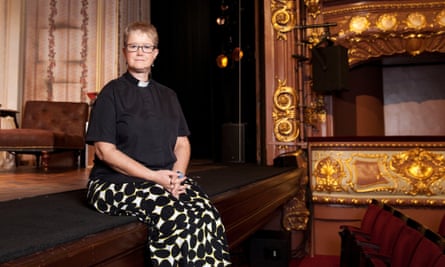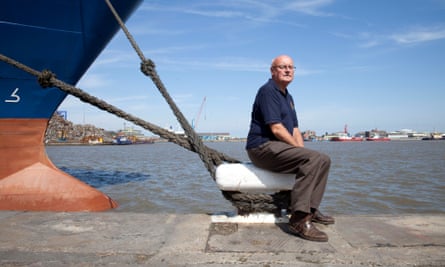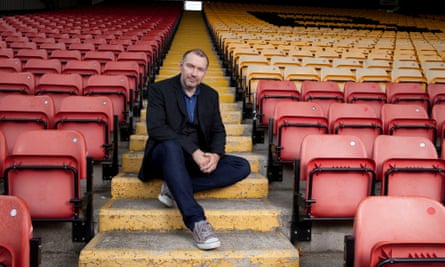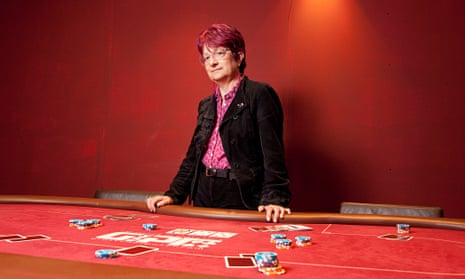There are a dozen people inside the Grosvenor casino in Luton, and one of them has never gambled in her life.
Actually that’s not entirely true, says Jenny Spouge, the casino’s in-house chaplain, as she walks around the gaming floor on a weekday afternoon. She once took part in a raffle, she recalls, and even found herself holding the winning ticket. When Spouge is not working as a chaplain at the casino, she is a Methodist minister at a local church. She says she interpreted the raffle win – for which her prize was a bottle of Scotch – as a piece of divine teasing, and resigned herself from games of chance for ever. This afternoon she walks between the casino’s card tables and roulette wheels and ignores the flashing fruit machines. “Personally I can’t see the fascination.” She’s here today, and three times a week, to offer herself as a listening ear.
Spouge is among a soaring number of religious figures in the UK who have stepped outside their places of worship to work as chaplains in the wild – rostered, today, in the unlikeliest of places. There are people who describe themselves as chaplains working not only in hospitals and prisons and schools (perhaps the traditional realms we might expect) but also in shopping centres, gig venues, sports clubs. There are taxi drivers’ chaplains and truckers’ chaplains. According to a report this year by the religious academic Ben Ryan – a report commissioned by the Christian-inclined thinktank Theos: “In the UK, chaplains are everywhere.” They are “Operating in every conceivable sector!” added Nick Spencer, a Theos executive, in his introduction.
When the Bradford Bulls were relegated from the top flight of rugby league last year, among those trying to pick up spirits at the ailing club was the in-house chaplain, Warren Evans. In London, after the Apollo Theatre reopened in the West End following the dramatic collapse of the ceiling in the middle of a show, the refurbished auditorium was blessed by the Apollo’s own chaplain, Lindsay Meader. In Lincolnshire, the relief effort at Immingham docks – ruined by floods in 2013 – was aided by the shipyard’s live-in chaplain, a man in his 60s named Colum Kelly.

Flooding, collapsed buildings, relegation… generally, says Jenny Spouge, settling into a plush chair inside the casino’s poker room, the work of a chaplain is less dramatic. “I would say that for me at a casino it often means sitting in the staff room and watching garbage television.” Spouge, in her 50s, is not being glib. All the chaplains I speak to are in agreement that the most crucial part of the job is presence – being somewhere, passively, non-threateningly, so that when someone is ready to start a conversation they can. Warren Evans describes it as “loitering with intent. Because if you’re not there, you’re not there for the lost moments.”
At the casino, where pinlights in the ceiling simulate nighttime even though it is sunny outside, and unhappy-looking men and women crouch over machines and card tables, Spouge wears neutral clothes. Colourful shirt, grey jacket – no black and never a collar. “I’m not sure the term ‘chaplain’ is even always helpful,” she says, pointing at her staff badge, “because it’s got that churchy ring to it.”
What is a chaplain? Aren’t they churchy? The various backgrounds of the people who consider themselves chaplains, and the various places they minister, make precise definition tricky. There is no formal training. “Anyone can call themselves a chaplain,” Ben Ryan says. Though the vast majority are Christian, Ryan says that in Britain there are Muslim chaplains, secular chaplains. In his state-of-chaplaincy he quotes the following definition, originally composed by the theologists Sophie Gilliat-Ray, Ali Khan Mansur and Stephen Pattison. A chaplain is “an individual who provides religious and spiritual care within an organisational setting... Qualified religious professionals, or lay people” who in recent years have enjoyed “an expansion in the range of their activities”.
For Jenny Spouge, who spends long evenings as well as afternoons in the Grosvenor, this range of activities has come to include hearing the complaints of frustrated croupiers, directing troubled gamers towards support services, and often just “watching Hollyoaks” on one of the big screens with people who simply look like they could use some company. She was first employed here nine years ago – part of a pilot scheme that was supposed to be rolled out in casinos around the country but never was. When her initial contract came to an end, the pilot scheme abandoned, the Grosvenor decided to keep her on. The manager at the Grosvenor tells me proudly that his was the only casino in the country with a chaplain. “Jenny’s very good at asking: ‘What’s the “but”?’ And getting people to open up that way.”
“Listening, encouraging, being there” is how Warren Evans defines the modern chaplain’s role, wherever they work. Evans speaks to me while his rugby team are beginning training for a summer tournament. He has been chaplain at the Bradford Bulls since 2010. It was slow going at first, Evans explains, particularly in his work with more prominent sportsmen – celebrities in their world who have learned to be distrustful of strangers showing interest in them. “They watch you to see if you’re there for the glory. They watch to see if you’re there for the kudos. But you build up trust in small doses, and when they recognise you’re just there to help, people do engage. It takes time.” Evans describes himself as “a follower of Jesus”, but when I ask how many of the players and coaches he works with are of a similar faith – or of any faith at all – he says the proportion is small. “Maybe 10 or 20%. Most people are… indifferent.”
“We have a very firm policy that we’re there to support, not convert,” says Lindsay Meader, speaking to me one Saturday afternoon between matinée and evening shows at the Apollo. “We’re for people of all faiths and none.” Still, for all that, chaplaincy has a strongly Christian backstory. Theatre chaplains, Meader goes on to explain, have been around since the end of the 19th century, when a young curate of the Church of England noticed something. For touring companies of actors, Sunday was always moving day. None of them could ever access a vicar. “The curate thought: ‘The church is missing a trick here,’” said Meader.

Chaplaincy has waxed and waned as a priority for the church – the trick taken up and missed again – in the century since. A big chaplaincy push was made in the 60s and 70s, when the church made moves to place its ministers in ailing industrial sectors. Then there was a fade again before the present-day boom. Why now? Meader thinks it’s a result of changing (falling) patterns in churchgoing. “And the church kind of waking up and realising that, actually, we need to go out and meet people where they are, where they literally are.”
At the Apollo, Meader counsels actors, stagehands, electricians, carpenters, stage managers, front-of-house staff – often in the wings, grabbing a moment amid the West End chaos. As a theatre chaplain she’s discussed thwarted ambition with actors going nowhere and debated potential changes of agent. She’s encouraged shy front-of- housers along with screenplays or scripts. And she’s helped, too, in the aftermath of accident or tragedy.
Meader is uncomfortable speaking about the roof collapse at the Apollo. It is still, she says, a sensitive issue for staff. Anyway, she says, human tragedies take place all the time in theatres – as indeed anywhere where humans gather in numbers. Meader talks quietly about an elderly audience member who suffered a heart attack in the middle of a performance not long ago; she’d died by the time they got her out to the bar. “I sat together with the theatre manager and all the front-of-house staff, after that, to talk through what had gone on. Had they experienced something like that before? How did they feel about it?”
Meader thinks about half of the people she counsels in her work are Christians, like her. She makes an interesting point about her part-time chaplaincy work at the theatre and her day job, as a rector of St James’s church in Piccadilly. Her church happens to have a relatively large LGBT membership. And Meader has been fascinated, she says, by the contrast between the experiences of people who are gay and religious, and the people who are religious and theatrical. “I’ve had people who work in the theatre say: ‘It’s much harder to come out as Christian in the theatre than to come out being gay.’ I think we’ve come to a stage in society where actually it’s easier to come out as lesbian, gay, transgender, bisexual, intersex, than sometimes it is to come out and actually say: ‘I follow a particular religion.’” Put this way, it isn’t so surprising that a minister who wants to minister should take on the role of roving chaplain. Step into a less formal middle space. Meet people who want to be met, halfway.
“The general public has moved away from what we’d define as religion,” says Evans. “They’ve moved away from going to churches and places of worship.” The most forthright of the chaplains I speak to, Evans believes the results of this secularisation might be more damaging to the national psyche than is realised. “We’ve cut out faith,” he says, “but we don’t know how to grapple with the spirit.” Chaplains might know a few useful grappleholds, he suggests. Ask them to demonstrate.
Spouge at the casino, Meader at the theatre, Evans at the rugby club – all of them stress to me the non-pushy, “under-the-radar” nature of the job. When I speak to Colum Kelly, who for 11 years has served as a chaplain at Immingham Docks in Lincolnshire, it sounds as if he doesn’t always have the option to wait to be asked to help. On an average day, Kelly explains, 20 or 30 ships might come through Immingham, as many as 50 on a busy day. Freighters dock here full of coal, consumable goods, biomass, the crews made up of Chinese, Filipino, Russian, Ukranian sailors who have been packed together for weeks and “who know they’ve docked in the UK somewhere, but generally don’t have a clue where they are”. Kelly has set himself up, amid the cranes and building-high container stacks, as Immingham’s human face.
Recently he had to settle a borderline revolution on board a ship when a crew fell out with its employers over contract terms. He has helped with cases of “unpaid wages, bad food, bullying” and says he can only wonder about the unresolved situations on ships he doesn’t get a chance to climb aboard. Kelly has been a chaplain at Immingham for over a decade and even on a good day, he explains, it would not be possible for him to see even half the people who might want or need it. There are simply too many ships. “You target where you think you might be most needed.”

If crews have time, they disembark and are shown by Kelly to internet-connected computers he has set up in a room on the dock. If they’re due for a quicker turnaround, Kelly darts on board what ships he can. As a Catholic minister, he will perform rituals if he’s asked, but he says that only about half of the seafarers he encounters are religious, “missing the church connection”. Most, he says, are simply missing people.
The sailors Kelly meets have sometimes been on board their ships for months at a time. Last year he had to tell a group of Ukranian deckhands who had been out of touch with the world for weeks that their country was more or less at war. Some crews have been away so long “there have been deaths on board or accidents, with guys losing limbs. The worst I can remember is three dead on one ship out of a crew of 12.” He passes on a particularly harrowing story about a ship that came in from America early in the year. It was bound for Finland, manned by a Filipino crew. “A happy bunch. They’d got all the supplies on, everything was good – and then we suddenly discovered there was a change of orders. Instead of going to Finland, they were going to the west coast of Africa, where the Ebola was rife. They were in a state, they were screaming. Trying to get off the ship. A situation like that… they’re desperate.” Kelly listened. Tried to soothe. Then watched them go.
Many of his days as a chaplain are more ordinary than that, says Kelly. He echoes what I’ve come to see as the mantra of the modern chaplain: that if you’re not bored sometimes, you’re not doing it properly. Being present is everything. At that point “you try and do what you can,” says Kelly, “to bring some goodness into crap situations” And then he goes, to board another boat.

Comments (…)
Sign in or create your Guardian account to join the discussion